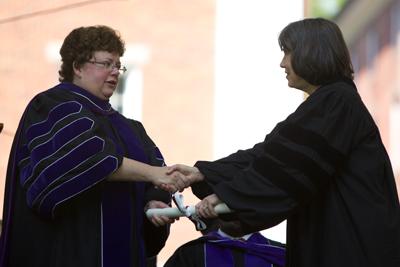
Doctor of Humane Letters
Since 2011, Sheila C. Bair has been senior advisor to The Pew Charitable Trusts, providing “counsel on the ways that federal, state and local govern ments can best ensure fiscal and economic stability and family financial security.” She was also chair of the United States Federal Deposit Insurance Corporation (FDIC), serving from June 2006 until July 2011 and playing a major part in the government’s response to the 2008 financial crisis. Before that, she was the Dean’s Professor of Financial Regulatory Policy for the Isenberg School of Management at the University of Massachusetts Amherst and an associate professor at the UMass Center for Public Policy and Administration.
The Kansas native earned a B. A. in philosophy from the University of Kansas and then a J. D. from the university’s School of Law in 1978. Her career started in the General Counsel’s office of the former U.S. Depart ment of Health, Education and Welfare. In 1981, Sen. Bob Dole recruited her to serve as counsel on his Washington, D.C., staff—a position she held through Dole’s 1988 presidential campaign. After an unsuccessful run for Congress in 1990, Bair was appointed by President George H. W. Bush in
1991, and then reappointed by President Bill Clinton in 1994, to the Com modity Futures Trading Commission. From 1995 to 2000, she was senior vice president for government relations at the New York Stock Exchange. Then she was assistant secretary for financial institutions at the U.S. Department of the Treasury before arriving at UMass in 2002. President George W. Bush appointed her to the FDIC four years later.
Bair received a citation from Secretary of the Treasury Paul O’Neill for helping to enact terrorism insurance legislation and develop the Treasury’s USA PATRIOT Act regulations after the 9/11 attacks. In 2009, she received a John F. Kennedy Profile in Courage Award and a Hubert H. Humphrey Civil Rights Award for having been “one of the first people to take notice and speak against an alarming trend in aggressive lending practices, warn ing of the need for more regulation to protect consumers” before the economic downturn. She is active in efforts to improve access to financial services among low and middleincome Americans and has written several books and articles to teach children about financial matters.